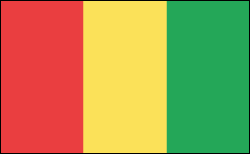Guinea News & Current Events


Liberia's Civil War Takes a Toll on Guinea
Guinea has had ongoing difficulties with its neighbor Liberia, which was embroiled in a long civil war during the 1990s and again in 2000–2003. Guinea had taken sides against rebel leader Charles Taylor in Liberia's civil war and was part of the Nigerian-led ECOMOG forces that intervened in the crisis. As a consequence, President Conté's relations with Taylor remained sour after Taylor became Liberia's president in 1997. The fighting in Liberia spilled over the border into Guinea on several occasions. Sierra Leone's recent civil war also caused problems for neighboring Guinea. Already burdened by an inadequate infrastructure and a weak economy, an influx of nearly 300,000 refugees from Sierra Leone has overwhelmed the country.
Conté's Leadership Is Challenged
In Dec. 2003 President Conté was reelected to a third term. In April 2004, after two months on the job, Prime Minister Lonseny Fall resigned and went into exile, claiming that the president would not allow him to govern effectively. President Conté is in poor health, and many fear a power struggle should he die or be deposed. Anti-government demonstrators took to the streets in January and February 2007, demanding that Conté step down. In addition, labor unions went on strike, paralyzing the country. Conté, who has been criticized as being corrupt, responded by declaring martial law. The strike ended in late February when President Conté agreed to name diplomat Lansana Kouyaté as prime minister. More than 100 people died in battles with security officials during the strike.
Kouyaté was sacked in May 2008 and replaced by Ahmed Tidiane Souaré, a member of President Conté's Party of Unity and Progress. Conte died in December 2008 after 24 years in power. Junior army leaders launched a bloodless coup shortly after his death. Many citizens, fed up with years of authoritarian rule, backed the coup. Army captain Moussa Camara took over as "president of the republic." The junta established a 32-member National Council for Democracy and Development (CNDD) that replaced the government. The council said its priorities would be to wipe out corruption and improve the quality of life in Guinea. In August 2009, Camara called for presidential elections to be held in January 2010, with parliamentary elections to follow in March, thus fulfilling a pledge to call elections within two years of assuming power.
A month later, security forces opened fire at a pro-democracy demonstration at a Conakry stadium, killing nearly 160 people. The victims were among thousands protesting reports that Camara planned to run in the upcoming presidential election. The African Union, European Union, and the U.S. imposed sanctions on Guinea following the massacre, and Humans Rights Watch issued a report that said the crackdown was intended to stifle opposition to military rule. Camara survived an assassination attempt by an aide in December and sought treatment outside of Guinea. He later said he would remain in voluntary exile in Burkina Faso. General Sekouba Konaté took over as head of the military junta and eased the country toward civilian rule. He named pro-democracy opposition leader Jean-Marie Doré, who was one of the protesters beaten at the protest in September, interim prime minister in January 2010, and declared that military leaders would not run in the country's presidential race—the first democratic elections since Guinea gained independence from France in 1958.
Presidential and General Elections Open to Doubt
Konaté kept his word in the June 2010 race. The first round of the election was inconclusive, and former prime minister Cellou Dalein Diallo faced opposition leader Alpha Condé in the run-off vote. Condé, a professor and opposition leader who has spent much of his life in exile in France, prevailed in the November run-off, taking 52.5% of the vote.
Originally supposed to take place within six months of the presidential election, Guinea's first general election since 2002 finally took place in Oct. 2013—three years late. President Alpha Conde's Rally of the Guinean People (RPG) party won 53 out of 114 seats in the national assembly, which is a slim working majority. International observers reported "breaches and irregularities" in the vote.
Ebola Outbreak Kills Hundreds
An outbreak of Ebola hit Guinea in March 2014 and spread to Sierra Leone and Liberia. By September, is estimated to have killed about 430 people in Guinea, and there were nearly 650 suspected and confirmed cases of it in the country, according to the Centers for Disease Control. In late August, the World Health Organization declared the outbreak an international emergency. It is the worst outbreak since the virus was first identified almost 40 years ago.
In the Oct. 2015 presidential election, President Conde won a second term. After the election, Conde appointed Guinean businessman Mamady Youla as prime minster. Youla's appointment showed Conde's focus on business, including boosting the country's private sector. Youla assumed office on Dec. 29, 2015.
See also Encyclopedia: Guinea .
U.S. State Dept. Country Notes: Guinea







